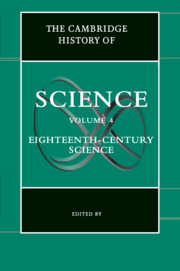Book contents
- Frontmatter
- 1 Introduction
- Part I Science and Society
- Part II Disciplines
- 10 Classifying the Sciences
- 11 Philosophy of Science
- 12 Ideas of Nature: Natural Philosophy
- 13 Mathematics
- 14 Astronomy and Cosmology
- 15 Mechanics and Experimental Physics
- 16 Chemistry
- 17 The Life Sciences
- 18 The Earth Sciences
- 19 The Human Sciences
- 20 The Medical Sciences
- 21 Marginalized Practices
- Part III Special Themes
- Part IV Non-Western Traditions
- Part V Ramifications and Impacts
- Index
- References
12 - Ideas of Nature: Natural Philosophy
from Part II - Disciplines
Published online by Cambridge University Press: 28 March 2008
- Frontmatter
- 1 Introduction
- Part I Science and Society
- Part II Disciplines
- 10 Classifying the Sciences
- 11 Philosophy of Science
- 12 Ideas of Nature: Natural Philosophy
- 13 Mathematics
- 14 Astronomy and Cosmology
- 15 Mechanics and Experimental Physics
- 16 Chemistry
- 17 The Life Sciences
- 18 The Earth Sciences
- 19 The Human Sciences
- 20 The Medical Sciences
- 21 Marginalized Practices
- Part III Special Themes
- Part IV Non-Western Traditions
- Part V Ramifications and Impacts
- Index
- References
Summary
The eighteenth century inherited a long tradition deriving from Greek antiquity that maintained that Nature could be understood by the exercise of reason. This belief underlay centuries of university practice in which natural phenomena had been explained by the use of logical deduction from first principles largely, although not exclusively, derived from the philosophy of Aristotle. The long shadow cast by such an entrenched intellectual position was still evident for much of the eighteenth century in the links that remained between natural philosophy and the larger philosophical enterprise of explaining the fundamental purposes that underlay the works of God and humankind. At the beginning of the eighteenth century, natural philosophy remained a branch of philosophy along with metaphysics, logic, and moral philosophy.
But it was to be one of the striking features of the century that, as it progressed, natural philosophy more and more was loosened from such traditional moorings and began to assume an independent stance. Indeed, whereas once natural philosophy had deferred to metaphysics, natural philosophy increasingly assumed the status of the defining form of philosophy, which moral philosophy attempted to emulate and which called into question the worth of metaphysical inquiry. By 1771, for example, the Encyclopaedia Britannica could justify the study of moral philosophy on the grounds that it resembled natural philosophy in that it, too, “appealed to nature or fact; depended on observation; and built its reasonings on plain uncontroverted experiments.”
- Type
- Chapter
- Information
- The Cambridge History of Science , pp. 285 - 304Publisher: Cambridge University PressPrint publication year: 2003
References
- 7
- Cited by



